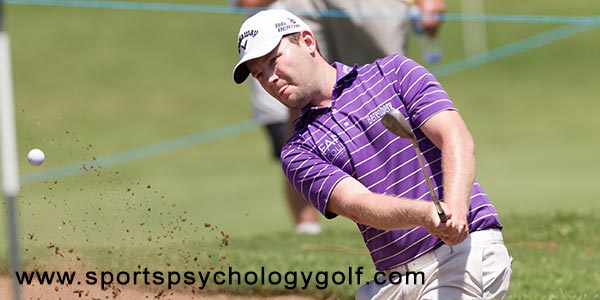
How to Respond to Bad Holes
What is your attitude when you are playing poorly during a round of golf? The effects of attitude are often overlooked by golfers.
When you are sinking putts and hitting greens, having a good attitude is effortless. When you are making birdies or pars, it is easy to maintain a positive attitude.
However, when your golf game is off, maintaining a good attitude is more challenging.
When you miss putts wide right, your attitude may be that you can’t putt well. When you continually miss the greens, your attitude may be one of resignation.
In our Golf Mental Game Survey, a collegiate golfer asked the following question:
“How can I stay positive after I double bogey or play a bad round?”
All golfers have faced similar circumstances throughout their careers. Maintaining a positive attitude is a constant battle. When you dwell on a bad shot or hole, frustration and resignation hurts your mental state and physiology.
Bad performances are often more memorable than successes. Negative experiences have an intense mental and emotional impact.
When you double bogey three holes in a row, you probably expect to double bogey the next hole. Your negative attitude will interrupt your focus, stir negative emotions, tighten your body, and interfere with your mechanics.
When you change your attitude, you enhance focus, reduce the impact of negative emotions, stay composed, and swing the club more freely.
Let’s be realistic, golf can be an emotional game. But if you learn how to shift perspective, you will stop the downward performance spiral and bounce back more quickly.
Maintaining a positive attitude when things are going wrong is an effective mental skill well worth developing.
At the 2021 WGC-Dell Technologies Match Play, Billy Horschel beat Tommy Fleetwood in the quarterfinals en route to his tournament victory.
Fleetwood controlled much of the match, but Horschel’s birdie on the 17th-hole finally tied the score. Eventually, Horschel outlasted Fleetwood and won in 19 holes.
HORSCHEL: “[My] swing got a little loose on the back end there, but I was able to battle it out. I’m not going to stress about it anymore, and I’m not going to worry about it. I’m just going to go play some golf and see where my game is and hopefully it’s good enough.”
Horschel’s mindset was to “just play some golf.” Horschel was focused on the process, not the results.
When you have a positive intention each hole, you will feel less stressed and able to play to the best of your abilities.
Staying Positive After a Bad Hole:
In the moment, saying to yourself “it’s just one hole, I have several left,” may not help you feel better…
But one thing is certain, if you dwell on the bad hole and feel frustrated-it will be harder to recover with a good hole.
You can’t get the double back because it’s in the past. You can only play on with composure and look forward to the remaining holes. Remind yourself that a double is not the end of the round unless you react with frustration and think that the round is shot.
Related Articles for Golf Mental Game:
- How to Perform Your Best Under Pressure
- Mental Game Tips for Putting and Chipping Yips
- How to Stay Confident Even After a Bad Round
Learn Proven Strategies to Perform with Confidence!

Do you suffer from fragile self-confidence after missed hits, playing with strict or high expectations that undermine confidence or the inability to play freely and relaxed on the course?
If you suffer from lack of focus, low self-confidence or other mental game obstacles on the course, you cant reach your true golf potential…
Successful golfers have learned how to perform with ultimate confidence in competition, so we’ve developed The Golfer’s Mental Edge Workbook and CD program to help you do this!
The Golfer’s Mental Edge program includes the top 8 mental training sessions I do with my personal students to help them boost their mental game and improve consistency on the course.
The Golfer’s Mental Edge program includes 8 confidence-boosting CDs, MP3 audio recordings, and an 8-session golfer’s mental edge workbook.